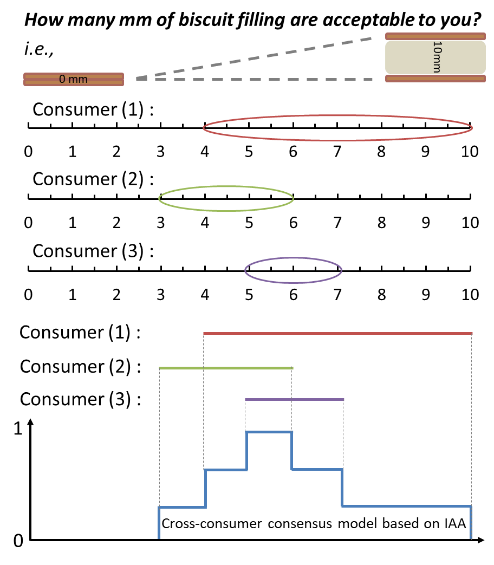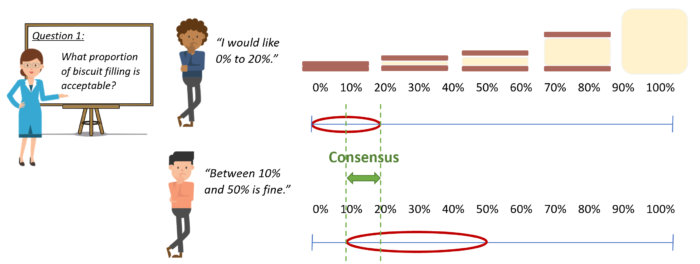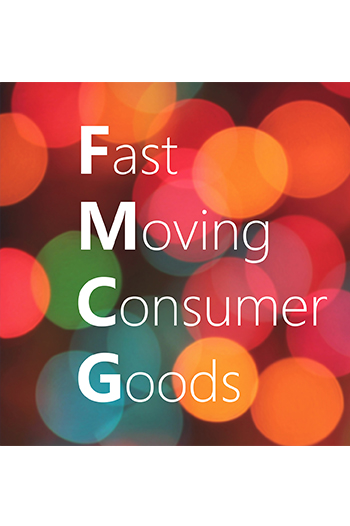10
06
.21
Empowering Consumers by Identifying Hidden Consensus
Modern manufacturing methods make it ever more feasible to personalise products – but how precisely do consumers know what they want? Of course, this varies – but in practice people will usually leave some uncertainty, or ‘leeway’, around their ideal product [Lin18], [Wan13], [Wri75]. Viewed conventionally, this can be a problem (i.e., noisy preference data), but this project aims to take advantage of the opportunities that it brings. Individual-level product personalisation can be uneconomical [Ahe19], [Tse98], however it may be possible to use the uncertainty and flexibility in consumer preferences to locate shared, or at least overlapping, areas of preference (e.g., within ‘consumer-archetypes’). This approach could represent a customisation ‘sweet-spot’ – leading to data-driven semi-personalised goods with scope for much wider use.
Furthermore, advances in data-driven product design have relied largely on passively captured data (e.g., purchase history & online behaviour [Jin16], [Kus07], [Maa14]), but these are of limited use for exploring potential of novel products, risking ‘lock-in’ and potentially stifling innovation. They also withhold consumers’ active choice, limiting their role to passive data-sources.
The last few weeks have seen the kick-off of the Horizon Agile ‘UnCoCo’ (Uncovering Consumer Consensus) project. Over the next year (running until March 2022), this project brings a multi-disciplinary team of colleagues together from Computer Science, the Business School, Horizon Digital Economy Research and the School of Law at Sheffield University.
- Christian Wagner – director/founder of Lab for Uncertainty in Data and Decision Making (LUCID), in the School of Computer Science – brings expertise in Modelling & Handling of Uncertain Data, Decision Support, and Data-driven Policy Design.
- Andrew Smith – director of the Neo-demographic Laboratory for Analytics in Business (N/LAB), at UoN Business School – brings expertise in Consumer Behaviour and Analytics.
- Dr Zack Ellerby – Research Fellow in Computer Science and LUCID member – brings expertise in Psychology, Decision Making, Experimental Design and Statistics.
- Dr Elena Nichele – Research Fellow at Horizon – brings expertise in Applied Linguistics, Marketing, and Qualitative Methods.
- Dr Jiahong Chen – Lecturer in Law, School of Law, Sheffield– brings expertise in Law and Ethics.
The project is working closely with a number of industry partners, including Nestlé and PepsiCo and will build upon recent research into using intervals as a highly efficient method to actively capture uncertainty and flexibility in human responses, such as consumer preferences [Ell19], [Ell20], [Ell21], [Nav16], [Wag15], [Wal16]. We aim to explore and validate capture of consumer preference uncertainty and flexibility using intervals, to better inform product design choices and enable products tailored to those with compatible (instead of just identical) preferences. We also want to understand how this approach could give consumers’ back more active choice in the product design process.
Our project has three core strands. These will run in parallel, and are each already getting going:
- ‘Giving decision makers what they need’.
We have been planning and preparing materials for focus groups – to obtain industry perspectives on scope for benefits, potential barriers to adoption, and best practices in effective communication of insights to decision makers.
- ‘Giving consumers what they want’.
We have been designing and preparing an experiment to empirically validate our approach. We want to answer questions including: Can it identify flexibility in preferences and ranges of acceptable products? Can it locate ‘hidden consensus’ between consumers? Could it enhance user engagement, satisfaction, and trust in the product design process?
- ‘Doing what is right’.
We have begun theoretical and empirical work aiming to pre-empt ethical risks (such as relating to privacy) and to identify potentially inequitable impacts. This has already led to collaboration with another Horizon Agile project ‘hoRRIzon’, involving a joint session using the ‘Moral-IT’ cards.


REFERENCES
[Ahe19] Aheleroff, S., Philip, R., Zhong, R. Y., & Xu, X. (2019). The degree of mass personalisation under Industry 4.0. Procedia CIRP, 81, 1394-1399.
[Ell19] Ellerby, Z., McCulloch, J., Young, J., & Wagner, C. (2019). DECSYS–Discrete and Ellipse-based response Capture SYStem. In 2019 IEEE International Conference on Fuzzy Systems (FUZZ-IEEE). IEEE.
[Ell20] Ellerby, Z., Miles, O., McCulloch, J., & Wagner, C. (2020). Insights from interval-valued ratings of consumer products—a DECSYS appraisal. In 2020 IEEE International Conference on Fuzzy Systems (FUZZ-IEEE). IEEE.
[Ell21] Ellerby, Z., Wagner, C., Broomell, S., (2021). Capturing Richer Information—On Establishing the Validity of an Interval-Valued Survey Response Mode. Behavior Research Methods.
[Jin16] Jin, J., Liu, Y., Ji, P., & Liu, H. (2016). Understanding big consumer opinion data for market-driven product design. International Journal of Production Research, 54(10), 3019-3041.
[Kus07] Kusiak, A., & Smith, M. (2007). Data mining in design of products and production systems. Annual Reviews in Control, 31, 147-156.
[Lin18] Lin, E. M., & Tseng, M. M. (2018). Tolerances of customers’ requirements: a review of current researches. Procedia CIRP, 72, 1208-1213.
[Maa14] Maaß, D., Spruit, M., & de Waal, P. (2014). Improving short-term demand forecasting for short-lifecycle consumer products with data mining techniques. Decision analytics, 1(1), 1-17.
[Nav16] Navarro, J., Wagner, C., Aickelin, U., Green, L., & Ashford, R. (2016). Exploring differences in interpretation of words essential in medical expert-patient communication. In 2016 IEEE International Conference on Fuzzy Systems (FUZZ-IEEE). IEEE.
[Tse98] Tseng, M. M., & Jiao, J. (1998). Concurrent design for mass customization. Business Process Management Journal.
[Wag15] Wagner, C., Miller, S., Garibaldi, J. M., Anderson, D. T., & Havens, T. C. (2015). From interval-valued data to general type-2 fuzzy sets. IEEE Transactions on Fuzzy Systems, 23(2), 248-269.
[Wal16] Wallace, K. J., Wagner, C., & Smith, M. J. (2016). Eliciting human values for conservation planning and decisions: a global issue. Journal of environmental management, 170, 160-1.
[Wan13] Wang, Y., & Tseng, M. M. (2013). Customized products recommendation based on probabilistic relevance model. Journal of intelligent manufacturing, 24(5), 951-960.68.
[Wri75] Wright, P. (1975). Consumer choice strategies: Simplifying vs. optimizing. Journal of Marketing Research, 12, 60–67.
Written by: Uncovering Consumer Consensus agile project team
Tags:
consumers,
customisation,
data,
data-driven,
ethics,
ideation cards,
privacy,
social,
societal,
technology,
trust,
trusted,
user engagement
















